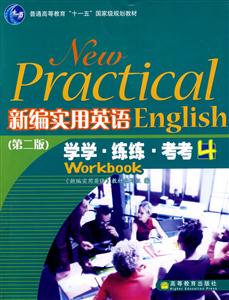-
>
鲍勃·迪伦诗歌集:1961-2012:典藏版
-
>
双城记-英文版
-
>
四级词汇词根+联想记忆法:乱序版
-
>
The secret garden
-
>
哈克贝利.费恩历险记/床头灯英语.2000词读物(英汉对照)
-
>
10000德语分类词汇联想记忆
-
>
英语词汇全书
新编实用英语学学.练练.考考-(4)(第二版) 版权信息
- ISBN:9787040228335
- 条形码:9787040228335 ; 978-7-04-022833-5
- 装帧:暂无
- 册数:暂无
- 重量:暂无
- 所属分类:>>
新编实用英语学学.练练.考考-(4)(第二版) 本书特色
欢迎学校、团体订购,联系人王先生010-51236217
新编实用英语学学.练练.考考-(4)(第二版) 内容简介
《新编实用英语》系列教材是由教育部高职高专教育英语课程教学指导委员会根据《高职高专教育英语课程教学基本要求(试行)》组织编写的。《新编实用英语》(第二版)系列教材是在《新编实用英语》(**版)的基础上修订而成。本套教材认真贯彻了“学一点、会一点、用一点”、“听、说、读、写、译并重”和“边学边用、学用结合”的原则。注重听说技能训练,注重对实用文体阅读能力的培养,将应用语言基本功的能力与实际涉外交际相结合。
本套教材还注重“教、学、考”相互照应。学完第2册可参加“高等学校应用能力考试”的b级考试,学完第4册可参加a级考试。
本书为《新编实用英语学学·练练·考考4》(第二版),共8个单元,编排模式与主教材基本相同,每个单元都由“说”、“听”、“读”和“写”4部分组成,另有一个“小幽默”。书后有自测题、练习答案和译文以及生词表。《新编实用英语学学练练考考(4)》附有多媒体学习课件光盘一张,并配有录音带。
新编实用英语学学.练练.考考-(4)(第二版) 目录
section 1 talking face to face
section 2 being all ears
section 3 maintaining a sharp eye
section 4 trying your hand
section 5 having some fun
2 art of negotiations
section 1 talking face to face
section 2 being all ears
section 3 maintaining a sharp eye
section 4 trying your hand
section 5 having some fun
3 dna and cloning
section 1 talking face to face
section 2 being all ears
section 3 maintaining a sharp eye
section 4 trying your hand
section 5 having some fun
4 the it age
section 1 talking face to face
section 2 being all ears
section 3 maintaining a sharp eye
section 4 trying your hand
section 5 having some fun
5 studying overseas
section 1 talking face to face
section 2 being all ears
section 3 maintaining a sharp eye
section 4 trying your hand
section 5 having some fun
6 art in engineering
section 1 talking face to face
section 2 being all ears
section 3 maintaining a sharp eye
section 4 trying your hand
section 5 having some fun
7 environment
8 cultural differences and bus-ness management
self-assessment
keys&translations
vocabulary&phrases
新编实用英语学学.练练.考考-(4)(第二版) 节选
版前言
《新编实用英语——学学·练练·考考》(New Practical Enghsh—Workbook)是《新编实用英语——
综合教程》的同步自学练习用书。本书紧扣《新编实用英语——综合教程》各单元的教学内容与体例,
力求巩固和扩大教材所设计的听、说、读、译、写等语言技能的训练和词汇、语法等语言知识与用法的
学习和提高。
《学学·练练·考考》的编排模式与《新编实用英语——综合教程》基本相同,二者互相配合照
应,因此它是配合教科书供学生自主学习的好伴侣。为了充分体现便于自学的特点,《学学·练练。考
考》有以下几个突出的特点:
1.阅读文章的生词都旁注在课文的右侧,十分便于学生独立阅读;
2.每课都加编了相应的Data Bank,为主教材中的相关表达练习提供辅助资料,这对提高学生的独立
运用能力十分有益;
3.在一般写作部分,各册加编了相关语法和写作知识的归纳小结,不仅为学生提供了其训练中所需
要的语言材料,而且帮助学生系统地归纳整理所学语言知识,从而能更有效地在实践中使用;
4.每册加编了2套自测模拟考题,第1册模拟英语应用能力B级考试;第2册的**套模拟B级考
试,第二套模拟A级考试;第3册模拟A级考试;第4册模拟大学本科英语4级考试。这既便于学生
自我检测,又便于衡量自己达到《高职高专教育英语课程教学基本要求(试行)》的程度。
综上所述,《学学·练练·考考》是学好《新编实用英语——综合教程》的重要辅学**材料,
它可以帮助学生复习所学内容,扩大练习园地,开阔知识视野,提高学习兴趣。将主教材和自主训练材
料很好地配合使用,一定会取得事半功倍的效果。
《新编实用英语——学学·练练·考考》第4册由广东公安高等专科学校向前进、王雨梅任主编,
徐伟成(广东公安高等专科学校)、周迎芳(华中师范大学)任副主编,张树德(广西工学院)、吴定芳、
李辉睦(佛山科学技术学院)、刘国生、曹佩升(广东公安高等专科学校)、向波阳、李桂芳(湖北师范
学院)等参加了编写,美国普渡大学Margie Berns审阅了全稿。
Art in Engifieer.ng
·wWhat Ybu ShouId Learn to DowWhat Y0u ShouId LeaFn t0
1.Finding OUt the basic quauficatiOIlS of an Kn0W About
engineer 1.The basic qualmcations 0f an enneer
1)Being versatile 2.HOW t0 become a qualmed engineer
2】Being resourcefLllI informed,cooperative,
supportive
3】Being 0pen—minded and having gOOd
communicative skills
4) Being creatiVe
2. Finding OUt the similarities and differences
between an engineer and an artist
3. Expressing views on hOW t0 be a gOOd
engineer
4.Creating a course advertisement
5.Expressing ways and methods
SpeQk More by YourSeIf
‘ Engineering louches our life.n so many ways lhat{t is hard f0 mink of someming mat is NOr in
SOme waV connectedt0 an engineer Or an engineering aehievemen莨ln additio、modem engi-
neering ls sO much blended with an that we often find one absorbed.n me Ome卜Read me foL
lowing COurse advertisement designed for intemational slucients.n China and practice the tWO
dialogues that7affIio毗
To meet the needs Of fbreign students whO wish tO become acquainted with Chinese language
and culture,Binhai universofiers a flexible programme of courses on‘℃hinese Culture&Mod.
ern Chiha".1hese courses can be Organized over periods Of 2—8 weeks according to the interests
and wishes Of groups Bumbering not fwer than 1 0.The activities wilI include lectures,field订ips,
recreatiOnal activities.etc.
The inclUSiVe fbe is US$32 per person per day.
Lall【guages 0f instmctiOn may be:Mandarin,Cantobese or English,as students may request.
Any indiVidual or OanizatiOn interested in any of these courses can contact Ms.Liu Ning,
Head of the Foreign Aifairs 0mce of Binhai UniversitV at 020.88889999.
1 Read a10Ud the f=oOWingdialogues based on tbe sample prov-ded above.You COUld practice role.
play with your partneh changing the infbrmation int0 your own.
dialague1
Jack: KeBBy,are you going to be an
engiBeer after graduation?
KeBBy: NOt necessarily.But siBCe I am
taking a degree in computer prO-
gramming,I’Il probably become a
software engineet.
Jack:Is a software engineer a real engi.
Beer?
Kenny: It depends on how you defiBe an
engineet.
Jack: I stiU Beed to understand the basic definition Of an‘‘engineer".
Kenny: An engiBeer is a prossiOnal problem.s01ver.He uses scientc
knowledge to design and construct the practical fhings we need in
lie.
Jack: What does an engiBeer actuaIly do?
KeBBy: He designs,creates,builds,improves,and invents——everything
fiom heart valVes and micFOChips to sky8cr8pers and space ve.
hicles.
Jack: I’m also tOld that a good engineet must be at the same time an artist.
Tsthat sn9
Kenny: You’re right.Think of the magnincent buildings around the WOrld.
Aren't they masterpieces Of art?
,
KaIly: Many people think that it’s not easy to be a quanfied engineer.
Tom: Yes,indeed.0ne has to get years
of training be幻re he can become
all engineer.
KalIy: And engineers shOUld be crea—I
tive,inquis.tive,analytical,and
detail.Ofiented,fight?
Tom: Yeah.They shOUld alSO have
gOOd communicatiVe skills,both
orally and in writing.
Kally: Why is that?
Tom: Because very onen they have tO WOrk as part of a team.
Kally: I see.An engineer,I guess,must be very specialized in his own field?
Tom: You’re right.But he has to be versatile,t00.
Kally: I don't quite understand?
Tom: You see,only a versatile engineer can be cre aliVe.
1) A: What son 0f profession will you go into when yOU graduate?
B: CiVil engineeting,Of COurse.
A: SOyou’re goingtObe anengineer?
B.I’dlove cobe all eHgineel
A:Why are you so interested in civil engineering?
B: I don't know.But whenever I see the magnmeent bridges,I jtlst can't help wantiIlg to be an
engineer.
sk二Talk dbOUt yourfaVOltrpFofessn.
2) A:HL Timlny.What’s that you're reading?
B:A bOOk on Chinese Buddhism.
A: Why?You dOll't want t0 become a monk,do you?
B: No,I’m Christiall.I’m jUSt iriterested in Buddhist architecturre,
A: I see.The temples are vespeci a【l and quite beautiel,aren’t they?
B: Yeah.I’m particularly interested in the pagodas(宝塔)a二t Shaolin Si.
Task Talk凸Oftftfamolls fapleyou'you,beento
- >
人文阅读与收藏·良友文学丛书:一天的工作
人文阅读与收藏·良友文学丛书:一天的工作
¥18.3¥45.8 - >
唐代进士录
唐代进士录
¥19.1¥39.8 - >
中国历史的瞬间
中国历史的瞬间
¥19.0¥38.0 - >
随园食单
随园食单
¥20.6¥48.0 - >
龙榆生:词曲概论/大家小书
龙榆生:词曲概论/大家小书
¥9.1¥24.0 - >
诗经-先民的歌唱
诗经-先民的歌唱
¥15.1¥39.8 - >
上帝之肋:男人的真实旅程
上帝之肋:男人的真实旅程
¥19.3¥35.0 - >
罗庸西南联大授课录
罗庸西南联大授课录
¥13.8¥32.0
-
2022图书×抽奖盲袋
¥9.9¥25 -
2023读书月阅读盲盒——天黑,闭眼,刀谁?
¥42.3¥158 -
2022读者节纪念徽章-三星会员专属
¥45¥45.6 -
2023读书月阅读盲盒——我什么场面没见过?
¥42.3¥158 -
2023读书月阅读盲盒——去码头整点什么薯条?
¥42.3¥158
















